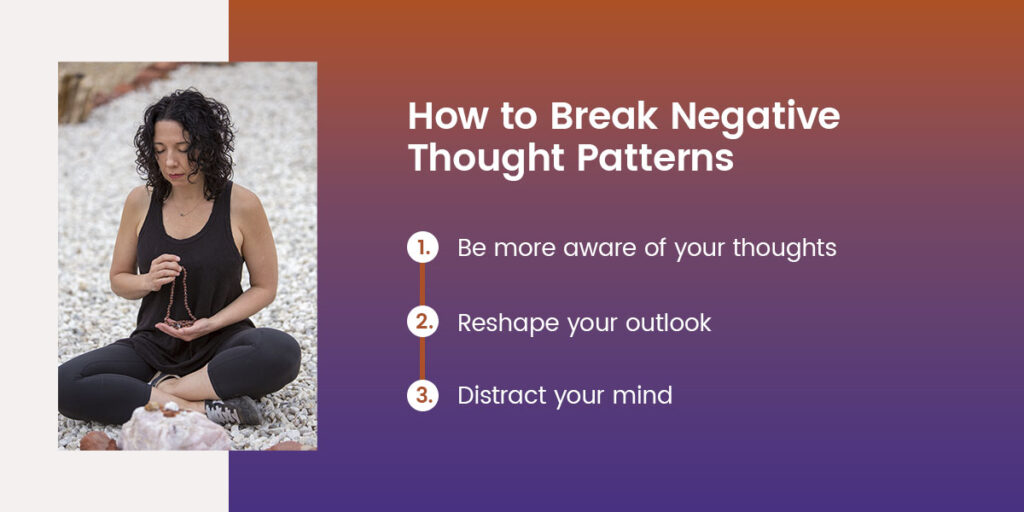The Link Between Depression and False Beliefs
Depression can be all-consuming: you don’t feel like yourself, it’s impossible to find joy in anything, and just getting out of bed in the morning becomes an unbelievably daunting task. Depression can make every day feel like an uphill battle and like all hope of ever being joyful again is lost.
But much of this is rooted in false beliefs. Our beliefs can hold great power over us — if we let them. But as we’ll see, that doesn’t have to be your whole story.
The term cognitive distortions refers to different types of negative thought patterns. These thought patterns can greatly undermine a person and rob them of their motivation and self-esteem, often leading to anxiety. Identifying the different types of negative thought patterns can help you take the first step toward overcoming them.
Types of Cognitive Distortions
These are some of the most common types of cognitive distortions you might experience. They are most typically experienced by those with depression or who lack self-confidence. By knowing what they are, you can change how you think to overcome them and their adverse effects on the mind.
- Overgeneralization: Overgeneralization is a distortion that occurs when you make a rule based on a single event or a few coincidences. Words like “never” and “always” are commonly used in sentences and thoughts. It leads to the assumption that every future event will play out the exact same way or have the same outcome.
- Discounting the positives: This negative thought pattern involves invalidating or ignoring positive things that happen to you. It is when you are actively rejecting positive feedback, results or events.
- Personalization: Personalization and blame work together to create a cognitive distortion where you will blame yourself or others for an outcome or situation. In reality, this situation was affected by various factors out of your control.
- All-or-nothing thinking: This can also be referred to as black-and-white thinking. This distortion is when you view something using absolute terms. Everything is good or bad, a win or a loss. This can limit the way you see your own strength and growth by not seeing the how picture.
- Emotional reasoning: Emotional reasoning is when you judge yourself or an outcome based on emotions. For example, if you feel guilty, emotional reasoning might make you think you are a bad person. You assume that because you are feeling a negative emotion about something, it must be a reflection of reality.
How to Break Negative Thought Patterns
Breaking the habit of negative thinking and self-talk can take time. These are some helpful tips that you can use to change the way you think and develop a healthier, more positive and more realistic outlook on life:

- Be more aware of your thoughts: Identify when you might be allowing cognitive distortions to warp the way you think about something. By knowing when this happens, you will be able to correct yourself.
- Reshape your outlook: Challenge the way you think. Assume you are growing when you might not succeed. Avoid thinking and speaking in absolutes. Be kinder to yourself and recognize your strengths. These are some ways to correct cognitive distortions.
- Distract your mind: Exercise is an excellent way of distracting yourself from cognitive distortions and negative thinking patterns. It is also healthy for you and produces serotonin. Meditation allows you to reflect on situations while relaxing your mind. This gives you the chance to correct the way you are thinking. Distract yourself with something comforting, like a hobby that gets you out of your head and stop overthinking something.
Change Your Thoughts, Change Your Life
False beliefs affect the way you feel about yourself and everyone around you. Because your mind and body are inextricably connected, damaging beliefs often lead to symptoms of anxiety, addiction and depression. When you believe something to be true, you act as if it is — inevitably bringing more struggle into your life.
How Depression Breeds Fear
The false beliefs that echo through our minds during depressive episodes are the perfect breeding grounds for fear. Depression severely impacts self-worth, sending sufferers into an anxiety spiral of imagined failures. For this reason, depression and anxiety go hand-in-hand: roughly half of those with depression also struggle with anxiety disorders.
Depression and fear tend to reinforce each other — and being in a fearful state of mind prevents us from viewing our life’s circumstances accurately and making decisions that benefit us accordingly. It hinders our ability to live out our life’s true purpose and shine the light of our unique gifts upon others.
Just as a light turned on in a room dispels the darkness, awareness can dispel our fears. And we can apply this knowledge to effectively rework the deeply held, untrue beliefs that are keeping us in a depressed state.
Holistic Depression Treatment: A Light at the End of the Tunnel
Through epigenetics, we now know that we are not destined to live a life designed for us by our genetic predilection. There are plenty of practices available to help you rewrite your negative narrative. There are also a variety of therapists who are more than capable of supporting you through the process.
Cognitive restructuring (a part of cognitive-behavioral therapy), for example, helps you to identify your negative thought patterns and respond to them more soundly. Constructive journaling can help you gain a better understanding of your thoughts and reactions. And one-on-one counseling can help you develop your ability to be assertive with your own inner critic. Mindfulness meditation is particularly effective against depression, as it allows you to distance yourself from and gain more control over your conditioned emotional responses.
Rewrite Your Story With Integrative Depression Recovery
Our Integrative Recovery method focuses on neuroplasticity: the ability of your brain to change. New brain cells and connections can be promoted to reverse the effects of depression. Our holistic depression treatment methods include organic superfood nutrition, exercise therapy, meditation practice, counseling and bodywork to help you heal — for life.
Call us at (877) 710-3385 or email us at [email protected] to learn how we can help you.


